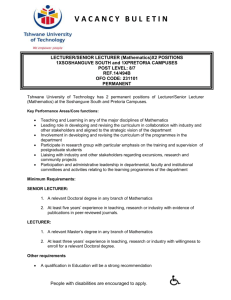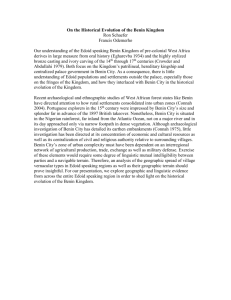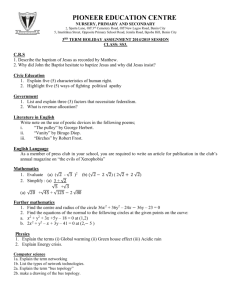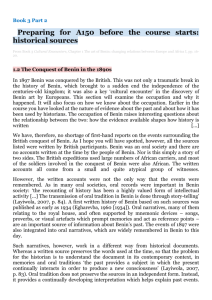Our Prospectus Here - Uniben... ::: Faculty of Education
advertisement
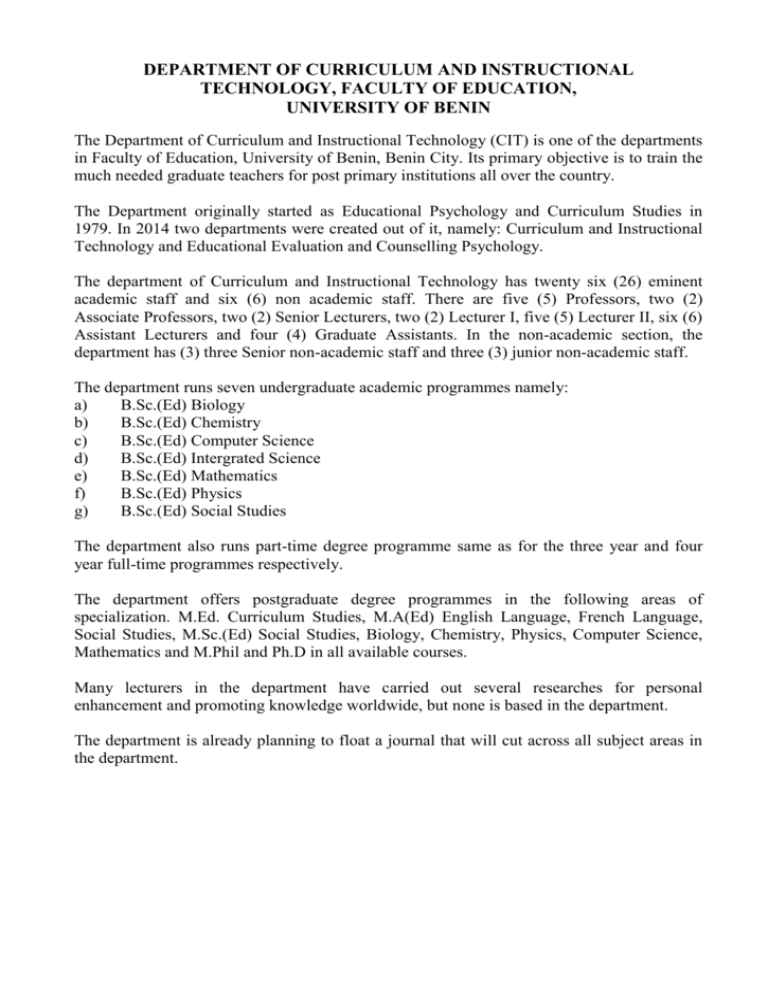
DEPARTMENT OF CURRICULUM AND INSTRUCTIONAL TECHNOLOGY, FACULTY OF EDUCATION, UNIVERSITY OF BENIN The Department of Curriculum and Instructional Technology (CIT) is one of the departments in Faculty of Education, University of Benin, Benin City. Its primary objective is to train the much needed graduate teachers for post primary institutions all over the country. The Department originally started as Educational Psychology and Curriculum Studies in 1979. In 2014 two departments were created out of it, namely: Curriculum and Instructional Technology and Educational Evaluation and Counselling Psychology. The department of Curriculum and Instructional Technology has twenty six (26) eminent academic staff and six (6) non academic staff. There are five (5) Professors, two (2) Associate Professors, two (2) Senior Lecturers, two (2) Lecturer I, five (5) Lecturer II, six (6) Assistant Lecturers and four (4) Graduate Assistants. In the non-academic section, the department has (3) three Senior non-academic staff and three (3) junior non-academic staff. The department runs seven undergraduate academic programmes namely: a) B.Sc.(Ed) Biology b) B.Sc.(Ed) Chemistry c) B.Sc.(Ed) Computer Science d) B.Sc.(Ed) Intergrated Science e) B.Sc.(Ed) Mathematics f) B.Sc.(Ed) Physics g) B.Sc.(Ed) Social Studies The department also runs part-time degree programme same as for the three year and four year full-time programmes respectively. The department offers postgraduate degree programmes in the following areas of specialization. M.Ed. Curriculum Studies, M.A(Ed) English Language, French Language, Social Studies, M.Sc.(Ed) Social Studies, Biology, Chemistry, Physics, Computer Science, Mathematics and M.Phil and Ph.D in all available courses. Many lecturers in the department have carried out several researches for personal enhancement and promoting knowledge worldwide, but none is based in the department. The department is already planning to float a journal that will cut across all subject areas in the department. HISTORY OF THE DEPARTMENT The Faculty of Education, University of Benin was established in 1974. As one of the oldest Faculties it had a primary objective to train the much needed graduate teachers for post primary institutions all over the country. It started as a single department located at the Ekehuan Campus of the University. The Department of Education then had two units – (1) Educational Administration and Foundations (2) Educational Psychology and Curriculum Studies. The first Dean of the Faculty was Mr. G. N. Enobakhare who acted from September 1974 to June 1975. The Department of Educational Psychology and Curriculum Studies which originally started in 1974 as a Division of Educational Psychology Guidance and Counseling was reconstituted into its present form of Educational Psychology and Curriculum Studies in 1979. Two departments were created out of Educational Psychology and Curriculum Studies in 2014, namely: Curriculum and Instructional Technology and Educational Evaluation and Counselling Psychology. The Department of Curriculum and Instructional Technology prepares students in the underlisted courses as part of the requirements for the award of B.Ed, B.A Ed. and B.Sc.(Ed.) degree in the Faculty of Education. However, the nomenclature of this degree was changed to B.A (Ed) and B.Sc (Ed) in 1996. PHILOSOPHY, AIMS AND OBJECTIVES OF THE DEPARTMENT The programmes in the department are designed to contribute to National development through training of manpower as to promote and encourage scholarship and community service. The various disciplines in the department shall promote developmental goals relevant to the nation through service delivery. The objectives of the Department include among others: a) To produce well rounded professional graduate teachers for Secondary Schools, Colleges of Education and eventually specialist graduate teachers for primary schools. b) To assist in the professional development and improvement of all categories of teachers through and certificate courses, seminars and workshops and other in-service training programmes. c) To prepare high-level manpower for tertiary institutions through graduate degree programmes. d) To promote research efforts by coordinating staff research activities through seminars, workshops and conferences. The Professional Objectives Graduates of our programmes are expected to have achieved all of the following: 1) A well rounded education to meet the rigorous academic demands of the classroom. In particular, they should be able to teach academic courses in their areas of specialization throughout the range of secondary schools, colleges of education and other educational institutions. 2) An understanding of the rationale for the methods and skills employed in teaching. 3) An effective application of methods and skills in their areas of academic specialization for the purpose of teaching. 4) Formulation and development of their own reasonable academic programmes and courses of instruction. 5) Use of their knowledge of educational theories in dealing with classroom problems as they arise. 6) Assessment of scientific effectiveness of the courses offered in Secondary Schools/Colleges of Education. 7) Be able to teach courses in Education in Teacher Education Institutions. ACTIVITIES a) Decision Making Process The department has various decision making process which are organized through Committees. These committees include Departmental Board of Studies, Postgraduate Committee, Welfare Committee, Seminar Committee and Appointment and Promotion Committee. Through these various committees vital decisions are taken to move the department forward. b) Staff Professional Development Members of staff in the department are given ample opportunity to update their knowledge and improve on their academic qualification, especially academic staff with Doctorate degree. Academic staff without Ph.D are sponsored by the University based on recommendation of the department. Members of staff are encouraged to attend seminars/workshops and academic conferences at both local and international levels. c) Staff Promotion Members of staff are promoted regularly, at least once in three years, so far they meet the University criteria for promotion to the next higher position. d) Students’ Welfare The department takes the welfare of its students seriously through the following processes: i) Handling of Academic and Non-academic Grievance Usually students have one complaint or the other to attend to from time to time. Students are encouraged to write to the head of the department stating the nature of their complaints or grievances and the kind of intervention needed. The head of department either handles the complaints himself/herself or refer them to appropriate committee for appropriate solution. ii) Academic Advising students in the department are assigned to lectures for course advising. Course advisers deal with issues bordering on course registration, results compilation, and other issues related to students’ courses. Course advisers are encourage to also attend to students personal problems that may affect their study. e) Examination Examinations are conducted according to the University laid down procedures at the end of every semester. The Head of Department is the Chief Examiner, while individual lecturers are the examiners in the course taught by them. The examination officer in department coordinates all activities relating to examination and reports directly to head of department. All results complied in line with the University’s Senate approved formats are submitted to the Departmental Board of Studies for appropriate action. The Dean of the faculty subsequently presents the results to senate for approval. It is only after the Senate approval that results are posted on the notice board for the notification of students. The final results are usually made up of the end of semester examinations and continuous assessment administered by lecturers. f) Students’ Union The students in the department are encouraged to join any students’ union approved by the University to enable them to develop social and communications skills. These unions/associations are rallying points through which students express their extra curricular activities and pursue other wholesome pursuits which may serve their overall interests. ACADEMIC PROGRAMMES I. UNDERGRADUATE a) B.Sc.(Ed) Biology b) c) d) e) f) g) B.Sc.(Ed) Chemistry B.Sc.(Ed) Computer Science B.Sc.(Ed) Intergrated Science B.Sc.(Ed) Mathematics B.Sc.(Ed) Physics B.Sc.(Ed) Social Studies ACADEMIC STAFF LIST S/N 1. NAME Dr.(Mrs.) E. O. Okobia 2. Prof. A. O. Urevbu 3. Prof.(Mrs.) C. N. Omoifo 4. Prof. E.O.S. Iyamu 5. Prof. S. E. O. Aduwa-Ogiegbaen 6. Prof. A.I. Imogie 7. Dr. (Mrs.) Lucy Eraikhuemen QUALIFICATIONS NCE (Agbor), B.Ed, M.Ed, Ph.D (Benin) B.Sc (Ed), M.Ed (Zaria), Ph.D (Wisconsin) B.Sc. (Ed), M.Ed (Zaria), M.Sc, Ph.D (Benin) B.Sc (Nsukka), M.Ed, Ph.D (Benin) B.A (Ibadan), MA (Wayne State), PDGE, Ph.D (Benin) B.A (Ed) (Ife), M.A (Ed.) Ph.D (Michigan) B.Ed, M.Ed, Ph.D (Benin) AREA OF SPECIALITY Curriculum /Social Studies 8. Mrs. Stella I. Uyi-Osaretin B.A (Ibadan), M.Ed (Benin) 9. Dr. John Egharevba B.Ed (Ife), M.Ed, Ph.D (Benin) 10. Dr.(Mrs.) Rose Jummai Musa B.A (Ed), M.Ed., Ph.D (Abraka) 11. Dr. Regina B. Danner B.Ed, M.Ed, Ph.D (Benin) 12. Dr.(Mrs.) F. N. Ofuani B.Ed, M.Ed, Ph.D (Benin) 13. Dr. F. O. Idehen B.Ed., M.Ed., Ph.D (Benin) 14. Dr.(Mrs.) A. H. Oyakhirome B. Ed, M. Ed, Ph.D(Benin) 15. Dr.(Mrs.) J. E. Awanbor 16. Mr. A. E. Ogumogu B.A. (Kano), M.Ed., Ph.D (Ekpoma) B.Sc. (Ed.), M.Ed (Benin) 17. Mr. R. O. Uzamere B.Sc. (Ed), M.Ed (Benin) Curriculum/ Language Education Curriculum/ Language Education Curriculum & Language Education Curriculum/Mathematics Education Curriculum/ Science Education Curriculum/ Language (French) Curriculum/ Science Education Curriculum/ Social Studies 18. Mr. L. O. Aimiyekagbon B.Sc, M.Ed (Benin) Curriculum/ Social Studies 19. P. Igubor (Miss) Curriculum/ Language 20. I. I. Omoregbe (Mrs.) B.A (Ed) (Benin), M.Ed (Ibadan) B.Sc. (Ed.), M.Sc(Ed) (Benin) 21. P. O. Omere (Mrs.) B.Sc. (Ed.), M.Sc(Ed) (Benin) 22. B. N. Aghahowa (Mrs.) B.Sc (Ed), M.Sc(Ed) (Benin) Curriculum/ Science Education (Mathematics) Curriculum/ Social Studies Curriculum & Instruction, Science Education Curriculum & Instruction, Science Education Curriculum Studies/ Social Studies Curriculum/ Instructional Technology Curriculum/Instructional Technology Curriculum & Mathematics Education Curriculum/Language Education Curriculum/ Social Studies Curriculum/ Social Studies RANK Associate Professor Professor Professor Professor Professor Professor Associate Professor Snr. Lecturer Senior Lecturer Lecturer I Lecturer I Lecturer I Lecturer II Lecturer II Lecturer II Lecturer II Assistant Lecturer Assistant Lecturer Assistant Lecturer Assistant Lecturer Assistant Lecturer Assistant Lecturer 23. E. I. Essien (Mrs.) Curriculum/Social Studies Graduate Assistant F. E. Daudu (Mrs.) B.Ed. (Benin), M.Ed. (Admin & Planning), M.A. Law & Diploma (Jos) B.Sc(Ed) (Benin) 24. Curriculum/Social Studies 25. B. O. Osaghae (Miss) B.sc (Ed) (Benin) Curriculum/ Social Studies 26. Mr. F. O. Idiaghe B.Sc(Ed) (Benin) Curriculum/Science Education (Biology) Graduate Assistant Graduate Assistant Graduate Assistant SENIOR NON ACADEMIC STAFF S/N NAME QUALIFICATIONS 1. 2. M. E. Ese-Nosakhare (Mrs.) Arigbe-Osula Osa. 3. C. N. Aigbovia (Mrs.) HND Business Admin. (Enugu) B.Sc Computer Science (Ekpoma) B.Sc Business Admin. (Benin) JUNIOR NON ACADEMIC STAFF S/N NAME QUALIFICATIONS AREA OF SPECIALITY Administration Department Secretary Administration 1. R. A. Olawuyi (Miss) NABTEB NBC/NTC AREA OF SPECIALITY Data Entry 2. 3. R. Ekhator (Mrs.) N. E. Itoyah (Mrs.) Primary School Leaving Cert. Senior School Cert. Office Assistant Office Clerk RANK H.E.O Programmer H.E.O RANK Senior Data Entry Personnel Office Assistant III Senior Clerical Officer ADMISSION REQUIREMENTS Biology a) Four-year Programme candidates seeking admission into this programme should possess any of the following qualifications: At least five Ordinary Level Credit passes in WASSCE, WAEC/GCE, NECO, SSCE/NABTEB, NTC/NBC or at least five merit level passes in the Teachers Grade II Certificate Examination (TC II) or any other recognized equivalents obtained at not more than two sittings. The subjects should include English Language, Biology, Chemistry and Mathematics. NOTE: The University Matriculations Examination (UME) subjects are: (a) Use of English (b) Biology (c) Chemistry (d) Mathematics or Physics Chemistry Four-year Programme Candidates seeking admission into this programme should possess any of the following qualifications: At least five Ordinary Level Credit passes in WASSCE, WAEC/GCE, NECO, SSCE/NABTEB, NTC/NBC or at least five merit level passes in the Teachers Grade II Certificate Examination (TC II) or any other recognized equivalents obtained at not more than two sittings. The subjects should include English Language, Chemistry and Mathematics and two others from Biology, Agricultural Science and Physics. NOTE: The University Matriculations Examination (UME) subject are: (a) Use of English (b) Chemistry (c) Mathematics (d) Biology or Physics B.Sc (Ed) Computer Science (a) Four-year Programme Candidates seeking admission into this programme should possess any of the following qualifications: At least five Ordinary Level Credit passes in WASSCE, WAEC/GCE, NECO, SSCE/NABTEB, NTC/NBC or at least five merit level passes in the Teachers Grade II Certificate Examination (TC II) or any other recognized equivalents obtained at no more than two sittings. The subjects should include English Language, Mathematics, Physics and any other two subjects of which should be from Science or Social Science. NOTE: The University Matriculations Examination (UME) subjects are: (a) Use of English (b) Mathematics (c) Physics (d) Any other Science or Social Science subject. B.Sc (Ed) Mathematics Candidates seeking admission into this programme should posses any of the following qualifications: At least five Ordinary Level Credit passes in WASSCE, WAEC/GCE, NECO, SSCE/NABTEB, NTC/NBC or at least five merit level passes in the Teachers Grade II Certificate Examination (TC II) or any other recognized equivalents obtained at not more than two sittings. The subjects should include English Language, Mathematics, Physics and any other from Science or Social Science. NOTE: The University Matriculation Examination (UME) subjects are: (a) Use of English (b) Mathematics (c) Physics (d) Any Science or Social Science subject. B.Sc.(Ed) Physics Candidates seeking admission into this programme should possess any of the following qualifications: At least five Ordinary Level Credit passes in WASSCE, WAEC/GCE, NECO, SSCE/NABTEB, NTC/NBC or at least five merit level passes in the Teachers Grade II Certificate Examination (TC II) or any other recognized equivalents obtained at not more than two sittings. The subjects should include English Language, Physics and Mathematics in addition to two other Science subject one of which should be Chemistry or further Mathematics. NOTE: The University Matriculation Examination (UME) subjects are: (a) Use of English (b) Mathematics (c) Physics (d) Chemistry or Biology B.Sc.(Ed) Social Studies (Four Years) Candidates seeking admission into this programme should posses any of the following qualifications: At least five Ordinary Level Credit passes in WASSCE, WAEC/GCE, NECO, SSCE/NABTEB, NTC/NBC or at least five merit level passes in the Teachers Grade II Certificate Examination (TC II) or any other recognized equivalents obtained at not more than two sittings. The subjects should include English Language, Mathematics and any other Social Science subjects. a) b) c) UME Subjects (a) Use of English (b) Mathematics (c) Any two of Economics, Government and Geography. In addition, candidates for the four-year programmes are expected to score 200 marks and above in the UME and pass the University screening interview. DIRECT ENTRY (Three Year) Admission Requirements for the Three-Year Full Time Degree Programme (Direct Entry) Candidates who posses any of the following qualifications may be considered for admission: At least two merit level passes in the relevant subjects at the Nigeria Certificate in Education (NCE). In addition, candidates should possess five Ordinary Level Credit passes in WASSCE, WAEC/GCE, NECO, SSCE/GCE, NABTEB, NTC/NBC or five merit level passes in the Teachers Grade II Certificate (TC II) or any other recognized equivalent obtained at not more than two sittings. The ‘O’ level subjects or equivalents should include English Language and Mathematics and subjects relevant to the intended course of study (see UME Requirements). At least a merit level pass in the University of Benin Diploma or Diploma in relevant courses from a recognized institution and five Ordinary Level Credit passes including English Language and Mathematics obtained at not more than two sittings. The subjects should be relevant to the intended course of study (see UME Requirements). At least two Advanced Level passes in the General Certificate of Education (GCE) or the Higher School Certificate (HSC) or any other recognized equivalent in the relevant subjects areas and five ordinary level credit passes in WASSE, WAEC, GCE, NECO, SSCE/GCE, NABTEB, NTC/NBC or five merit passes at the TC II or any other recognized equivalent obtained at not more than two sittings including English Language and Mathematics. The ‘O’ Level subjects or equivalent should be relevant to the intended course of study (see UME Subjects). ADMISSION REQUIREMENTS FOR THE FIVE-YEAR AND SIX-YEAR PART-TIME DEGREE PROGRAMME Same as for the Three Year and Four Year Full Time Programmes respectively. NOTE: Waiver for Mature Candidates To qualify for admission under this category, candidates should satisfy the following conditions: (a) Should be 35years old and above (b) Should possess two merit level passes in the Nigeria Certificate of Education (NCE) and at least one Ordinary level credit pass in WASSCE WAEC/GCE, NECO, SSCE/GCE, NABTEB, NTC/NBC or at least one merit level pass in the Teachers Grade II Certificate Examination (TC II) or any of their recognized equivalent.
